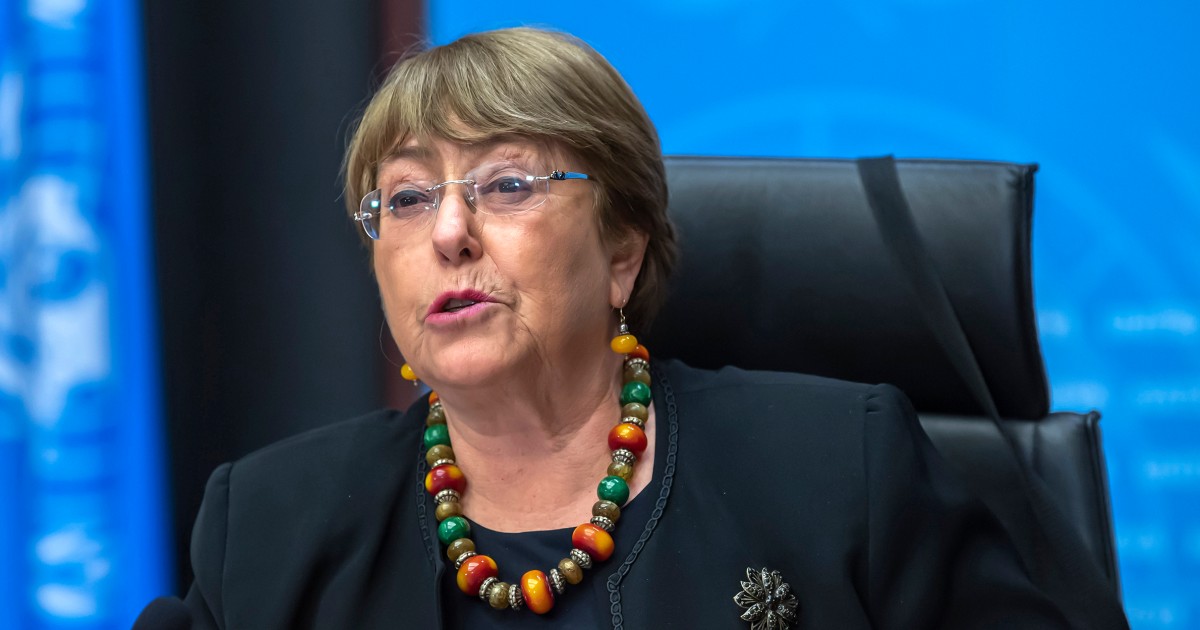
BEIJING — Chinese leader Xi Jinping defended his country’s record to the top U.N. human rights official on Wednesday, saying each nation should be allowed to find its own path.
Xi, who heads the ruling Communist Party that allows no political opposition and strictly limits speech, criticized countries that he said lecture others on human rights and politicize the issue.
“Through long-term and persistent hard work, China has successfully embarked on a path of human rights development that conforms to the trend of the times and suits its own national conditions,” Xi told U.N. human rights chief Michelle Bachelet in a video call, according to an online report by state broadcaster CCTV.
Download the NBC News app for breaking news and politics
Bachelet is in the middle of a six-day visit to China that includes stops in Xinjiang, a remote northwestern region where the Chinese government has been accused of human rights violations and genocide against Uyghurs and other ethnic groups. Her trip has been criticized by the U.S. and others, who think that China will limit whom she can talk to, stage manage her trip and use it for propaganda purposes.
The CCTV report didn’t mention Xinjiang or the Communist Party’s often harsh treatment of dissidents and activists and ethnic groups in Tibet and Inner Mongolia.
Xi laid out the Communist Party’s long-held position on human rights, which argues that China should find its own path and not completely copy the models of other countries and rejects outside criticism as interference in its domestic affairs. It also says that bettering the lives of people is the most important human right for developing countries, and points to China’s success in lifting people out of poverty.
“On the issue of human rights, there is no perfect ‘utopia,’” he was quoted as saying. “We don’t need ‘masters’ that dictate to other countries, let alone politicizing and turning the human rights issue into a tool, practicing double standards and interference in the internal affairs of other countries under the pretext of human rights.”
Bachelet, the U.N. high commissioner for human rights, said it had been valuable to have direct talks with Xi and senior Chinese officials on human rights issues and concerns in China and globally, her U.N. office said on Twitter.
“For me, it is a priority to engage with the government of China directly, on human rights issues, domestic, regional and global,” she said in her opening remarks at the meeting. “For development, peace and security to be sustainable — locally and across borders — human rights have to be at their core.”
China’s Foreign Ministry and CCTV quoted Bachelet as telling Xi she admired China’s efforts and achievements on poverty and human rights, but her office said she didn’t say that.
State Department spokesperson Ned Price said Tuesday in Washington that the United States does not expect China to allow the access Bachelet would need to get an unmanipulated view of the human rights situation in Xinjiang.
“We think it was a mistake to agree to a visit under these circumstances where the high commissioner will not be granted the type of unhindered access, free and full access that would be required to do a complete assessment and to come back with a full picture of the atrocities, the crimes against humanity, and the genocide ongoing in Xinjiang,” he said.
The U.S. ambassador to the United Nations, Linda Thomas-Greenfield, echoed the concerns.
“Horrified by the Xinjiang Police Files, which spotlight China’s mass incarceration of Uyghurs and other ethnic and religious minorities,” she said on Twitter, referring to a trove of leaked Chinese police photographs and documents published this week by a consortium of media including the BBC and USA Today.
NBC News is not part of that consortium and has not authenticated the documents.
The hacked documents include photographs of thousands of Uyghurs who have been detained, ranging in age from 15 to 73. According to the documents, their offenses included traveling overseas and having encrypted apps installed on their phones.
A Chinese Foreign Ministry spokesman called the reports “the latest example of anti-China forces smearing Xinjiang.”
Thomas-Greenfield said Bachelet and her office “must take a hard look at these faces and press Chinese officials for full, unfettered access — and answers.”
Source: | This article originally belongs to Nbcnews.com










